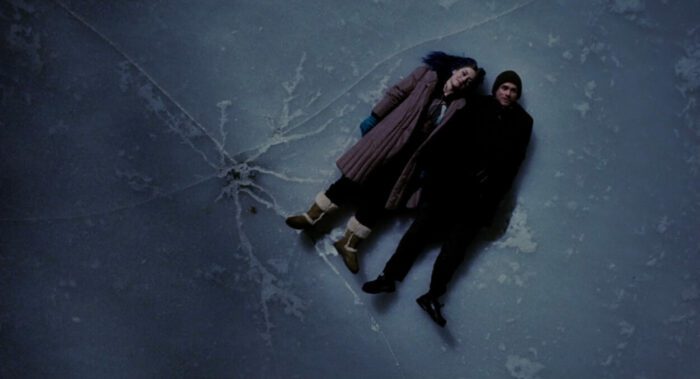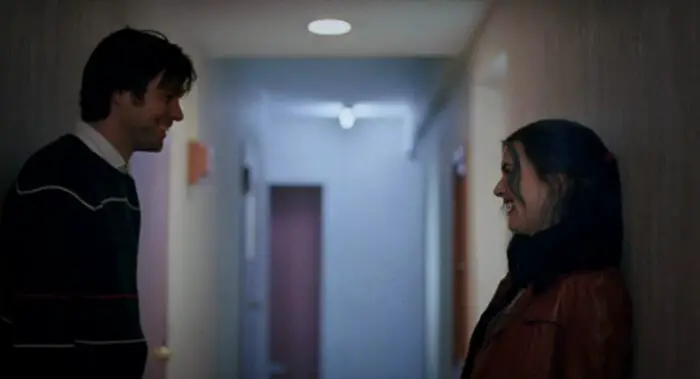How happy is the blameless vestal’s lot!
The world forgetting, by the world forgot:
Eternal sunshine of the spotless mind!
Each prayer accepted, and each wish resigned;
— Alexander Pope, spoken by Mary Svevo (Kirsten Dunst)
I’ve always been a romantic. Optimism seems to be my default, and it takes a lot for me to hate anything. However, I’m human, so I’ve had my fair share of dark moments throughout my life. Most of the time, these moments are spurred on by others, particularly those closest to me. I, too, have hurt people with my words and actions, and I’m not proud of any of it. Still, there are few instances in my life when I ever considered erasing the hurt I’ve caused. Unfortunately, I’ve thought about erasing nearly all the hurt I’ve received. How selfish is that?
Perhaps it’s obvious and basic to think about what Eternal Sunshine of the Spotless Mind has to say about memory, but it’s as good a place as any to start. I’ve always thought the film could work as a double feature with It’s a Wonderful Life, because both films are about people realizing that the lives they had were a lot better than they remembered. And that’s how it is, isn’t it? We recall the negative a lot more than the positive.
Eternal Sunshine of the Spotless Mind was conceived by director Michel Gondry and artist Pierre Bismuth and then ultimately written by Charlie Kaufman. Released in early 2004, it is one of the finest works of English-language cinema. It is, to put it directly, a masterpiece. Masterful craftsmanship aside, the themes of the film are timeless, specifically those addressing the consequences of what Lacuna Inc. does.
To me, it’s pretty easy to empathize with someone wanting to have parts of their memory erased. After all, the pain of losing a partner or a pet can sometimes be indescribable. I can understand why someone would want that pain erased. By extension, it makes sense that all traces of the pain be erased as well because getting rid of the root is stronger than getting rid of the plant.
As Pixar’s Inside Out would state for mainstream audiences a decade later, one needs sadness. It’s a part of life, and it’s necessary. What Eternal Sunshine of the Spotless Mind argues is that we need, not only sadness but everything else associated with it. As Joel’s mind begins to lose memories of him and Clementine, he begins to remember the good that came with the pain of heartbreak. To reference another film, Vanilla Sky, “Without the sour, the sweet is never as sweet.”
I’ve always wondered if Joel is the only person to go on a journey when losing memories to Lacuna Inc.’s process. Did Clementine also realize she didn’t want to completely lose her connection to Joel? Is this why, despite him doing his best to woo her using Joel’s stuff and actual language, she rejects Patrick so vehemently? Could this be why she, too, takes a train ride to Montauk? Did her memory of Joel on the day and night they met also tell her to meet him in Montauk? It makes sense to me if that happened.
Perhaps it’s also possible that Dr. Howard Mierzwiak, played wonderfully by the late great Tom Wilkinson, knows this is something that happens. Then again, unless he’s gone through the procedure himself, how would he know? Fair enough. Would Stan know? (Note: Mark Ruffalo is an absolute delight in this film, though I’m unsure how I feel about that moment he honks the horn to alert Howard that his wife has shown up.) Does this make a difference? I believe it does.

Take ©Kirsten Dunst’s incredible portrayal of Mary. She is a young receptionist at Lacuna who harbors feelings for Howard. Near the film’s end, it’s revealed that she had the procedure done to forget her feelings toward Howard. This knowledge alone is enough to start breaking Mary’s spirit. Speaking for myself, whether I chose to go through this procedure or not, coming out the other side of it would literally make me a different person. If memories, at the very least, help shape who I am, then it stands to reason that removing any would alter me as a person. This person who comes away from the procedure would not be who I was. It would be someone new. The person Mary is now is not the same one who wanted the procedure.
Right? Well, this gets complicated after Mary searches for and finds her file at Lacuna and listens to her interview with Howard. It seems that he pressured Mary into getting the procedure. Of course, why then would he keep her around? Perhaps, to fire her would do more than “simply” erase her memories associated with her feelings toward Howard, because it would involve a lot more than the procedure. It would be altering her as a person, her life as it is, and her life trajectory, among other things. So, I suppose I could accept that keeping Mary around is “the kind thing to do.” Howard wouldn’t want her to wake up one day to a different routine, place of work, and who knows what else.
Of course, I’m unsure if Howard is a good person or not. First of all, it’s very strongly implied that he did have an affair with Mary, which already has me judging him. Second, he seems to have pressured her into the procedure. Third, it’s possible he keeps Mary around because, well, he likes having Mary around. She is young, and attractive, and practically worships him. Anyone who invents a procedure that can fundamentally change a person would probably result in that person having some level of a God complex, I believe. I’m sure he likes the way Mary makes him feel.
I mean, he has to know that if Mary developed feelings for him before she would develop them again, right? If there exists the possibility that he knows about how those who take the procedure leave a crumb of something behind to reignite whatever was lost, then yeah, Howard made the selfish decision to keep Mary around because there was a chance she’d fall for him again.
Sure, we see him uncomfortable whenever she touches him and speaks admiringly to him. But when they’re alone, I don’t know. Does he put up much of a fight after Stan leaves Joel’s apartment and Mary approaches him? I can see that maybe he does, but at the same time, again, Howard knows their history and what he, most likely, made her do. Now, I know, Mary has agency and could’ve said no to the procedure and walked away, but again, Mary worships this man. He must’ve known this and used the power he held in the relationship to get her to go along with the procedure.
All of this said Howard does seem confused about Joel fighting the procedure, and I believe that because he’s not the one doing this procedure. Stan seems to be the guy who does them, or at least a good amount of them. It’s not implied that Joel’s issues have happened before. So, fine, Howard doesn’t know about Joel’s journey. Because of this, it’s also unreasonable to assume that Clementine had this issue, too. Or is it?

Stan is distracted right away when the procedure goes underway, thanks to the really slimy Patrick (played slimily by Elijah Wood), who keeps bothering Stan about his “girlfriend,” who is actually Clementine, which I’ll get back to in a moment. Later, he even drinks Joel’s booze and smokes marijuana with Mary. Stay with me, but is it possible that Stan could’ve righted things with Joel right away, on his own, if he hadn’t been distracted, buzzed, high, and dancing in his underwear with Mary on top of Joel? If so, Howard wouldn’t have needed to be called.
Perhaps this is something that happens, and when a technician is on top of it, it’s simply a weird thing or a glitch, not a big deal. Perhaps Clementine went through a similar thing that Joel went through. Is this why she rejects Patrick?
Well, there’s another explanation. If Clementine didn’t fight the erasure of her memories, she is still affected by the procedure. If she truly loved Joel, I believe there would be a massive hole in her heart. She wouldn’t know why, just that one morning she woke up and felt a need to fill that hole. Enter Patrick, who starts wooing her as soon as possible. When Joel shows up at Lacuna Inc., Patrick seizes the opportunity to take Joel’s stuff and tries to get Clementine using everything Joel did in their relationship.
It doesn’t work, though, because Patrick isn’t Joel. Clementine’s hole needs Joel because that’s who filled it before. Patrick does his best to do all the right things, but because he’s not genuine, because he pretends to be Joel, Clementine doesn’t care much for the guy. If Patrick were himself, well, she probably still wouldn’t like him much, and honestly, who could blame her? I hate Patrick. Still, she keeps him around because of the artificiality that Patrick brings by trying to fill that Joel-shaped hole in her. It makes sense because there’s something inside her that likes Patrick’s courtship but there’s also something that rejects it because it’s fake.
When they go to the Charles River, Patrick tells her the same thing Joel did, but Clementine’s reaction is to leave. Patrick is a creep, and even though he does his Joel impression, it doesn’t work. Clementine wants Joel, but she doesn’t know why.
What I’m talking about is the train ride back from Montauk. She clearly likes this quiet guy, but she doesn’t know why. At the same time, there’s something about him that irritates her, but again, she doesn’t seem to know why. Whether a part of her subconscious told her to find Joel again or not is irrelevant. Clementine has a hole inside her, and she needs Joel. This would seem to mean that she is incomplete without him. To an extent.
I used to believe in the whole “You Complete Me” thing from Jerry Maguire, but then I grew up. I understand now that no one really needs anybody to be happy. However, in this case, Clementine’s memories with Joel were just that. They were their memories, not just hers. Removing them meant not just removing Joel but removing pieces of herself as well. As Patrick tries to piece her back together, she rejects it, because the specifics of her and Joel’s time together are just minutiae. The important thing is how she felt. Yep. Eternal Sunshine of the Spotless Mind is so earnestly about love.
The reason why I buy Joel and Clementine’s decision at the end of Eternal Sunshine of the Spotless Mind to begin their relationship anew, even though it could end once again with the two of them resenting each other, is because of the holes inside each of them. Before they met, we can assume they were fairly complete human beings, going about their lives with work, relationships, and whatnot. But then they found one another, and they were happy. When that was taken away, there’s no mystery as to why they would need one another.
Watching the film this time around made it clear that aside from the memories at the end of their relationship, the rest of Joel’s memories of the two of them were fun, cute, intimate, loving, and warm. Now, yes, these are from Joel’s perspective. However, I see no reason, after watching the film again, to assume that Clementine remembered things similarly. There’s a reason she’s attracted to Joel in Montauk and on the ride back. She must’ve been happy in her relationship, but at the same time, no one is perfect. Joel did things that annoyed her or hurt her feelings, and yeah, there’s a good chance they will break up again. Still, I understand why they’d want to start over.
It’s okay to be selfish in life. Putting oneself first is not necessarily a bad thing. However, there’s something to be said about putting others before oneself, or even just putting others on the same level as oneself. How great would it be to remove the blame from an argument or an incident? If I were to remove the memory of such an action on my part, would I be removing the blame as well? Is it possible to remove the hurt? The argument and the incident did still occur, but not for me. I could go to Lacuna and remove my memories and be happy. If I could do this for the rest of my life, well then, eternal sunshine of the spotless mind indeed.

Joel and Clementine choose to re-do their relationship, even if a bad ending is both possible and probable. They do this because a true relationship means taking a risk. It means exposing yourself to arguments, words that cut deep, and both memories that you look back on with fondness and memories that make you wish you could go back in time and change things.
We can’t go back in time. Even in the world of Eternal Sunshine of the Spotless Mind, there’s no time travel. The closest thing to it is when Joel revisits his memories. But they are just memories, not the reality of what happened. What happened was that Joel met a woman and fell for her. That woman made him happy until she didn’t. And instead of accepting things and looking back at the good, he wanted out of it. He wanted all traces of her removed from his life.
Now, to be fair, she did it first, but we don’t follow Clementine’s story, and I can make all the assumptions I want, but the film ultimately says that things happen, and pretending as they did is not the correct way to go about it. What, then, is the correct way? Easy. Confront the truth, as in Mary sending everyone their files. Then, choose what to do next. Re-start or move on.
Eternal Sunshine of the Spotless Mind doesn’t get the attention it deserves. Even in a modern critical context, it is more than a film with a white cis male lead, made by white cis males. I can understand how limiting it can be to engage with material that, on the surface, would look as if one couldn’t identify with anyone on screen or off it.
But Kate Winslet rightfully earned her Oscar nomination two decades ago. (Once again, Carrey wasn’t given a nod, despite this being one of the best performances of his career.) Her character is not one-dimensional, and given the structure of the film, she could’ve easily been, so in the film’s 18-minute opening, she gets a line like this:
CLEMENTINE: Too many guys think I’m a concept, or I complete them, or I’m gonna make them alive. But I’m just a fucked-up girl who’s lookin’ for my own peace of mind; don’t assign me yours.
Well, amen, Clementine! She is such a good character that I hope to read more pieces about her for the film’s anniversary.
But I don’t want to get off-topic here. The reason I love Eternal Sunshine of the Spotless Mind is a combination of things. I love the aesthetic, the themes and ideas, the characters, the music, and ultimately, how it makes me simultaneously think and feel. Michel Gondry knocked it out of the park with this one. Memories really do shape who we are and without them, there would be holes in our minds, our hearts, and our souls. For me, at least, I need to remember as much as I can, both the good and the bad.
I don’t want to be selfish and live in a bubble. I want reality; I want love and everything that comes with it. Life isn’t one thing or another. It’s more than binaries. It’s the mind and also the heart. It’s living without a hole inside oneself. It’s understanding, letting go, and moving on. Or, in the case of Joel and Clementine, doing it all over again. For love.



